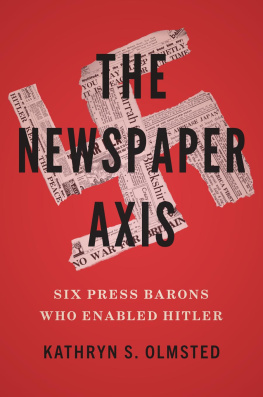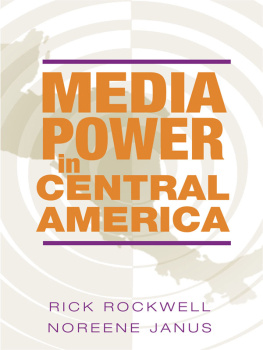T H E N E W S P A P E R A X I S

Copyright 2022 by Kathryn S. Olmsted.
All rights reserved.
This book may not be reproduced, in whole or in part, including illustrations, in any form (beyond that copying permitted by Sections 107 and 108 of the U.S. Copyright Law and except by reviewers for the public press), without written permission from the publishers.
Yale University Press books may be purchased in quantity for educational, business, or promotional use. For information, please e-mail (U.K. office).
Set in Janson type by IDS Infotech Ltd.
Printed in the United States of America.
Library of Congress Control Number: 2021942672
ISBN 978-0-300-25642-0 (hardcover : alk. paper)
A catalogue record for this book is available from the British Library.
This paper meets the requirements of ANSI/NISO Z39.48-1992 (Permanence of Paper).
10 9 8 7 6 5 4 3 2 1
For Eric
Contents
Acknowledgments
I AM GRATEFUL TO THE many archivists and librarians who helped me with this project, with special thanks to archivists Virginia Lewick at the Franklin D. Roosevelt Presidential Library, Spencer Howard and Craig Wright at the Herbert Hoover Presidential Library, Eric Gillespie at Cantigny Park, and Anne Thomason at the Lake Forest College Archives for providing exceptional assistance. I also thank Davor Mondom at Syracuse University for photographing documents for me. I conducted the initial research for this book while enjoying fellowships at Clare Hall and at the Centre for Research in the Arts, Social Sciences, and Humanities at the University of Cambridge.
Here at UC Davis, Daniel Goldstein at Shields Library agreed to buy twelve years of microfilm of the San Francisco Examiner, and Brian Scheu, Jeremiah Daniel-Padgett, Sarah Ainsworth, and Isabella Ainsworth trawled through those reels to help locate articles. Isabella also found and photographed documents for me and read the entire manuscript with care and precision. Jason Newborn assisted me by obtaining microfilm of the WashingtonTimes-Herald and other texts through interlibrary loan. I also appreciate the support of the Academic Senate Committee on Research.
I benefited greatly from colleagues who provided insights. Todd Bennett was kind enough to read Nichols alerted me to key documents and works. I also received helpful advice from colleagues who heard me present parts of this project at conferences. I am grateful to Mark Brilliant, Caitlyn Rosenthal, Nils Gilman, Robin Einhorn, and Brooke Blower for providing helpful feedback on the first draft of my proposal for this book at the Greater Bay Area Modern American Political Economy Seminar. I am especially indebted to Brooke, who gave astute advice each time she heard me present a different iteration of the project. I also appreciate the comments I received after presentations at the Organization of American Historians annual conference and two conferences of the Boston-California-London political history group. Special thanks to Jennifer Burns, Jim Campbell, John Huntington, Bruce Schulman, and David Astin Walsh for their comments at these venues. Here at UC Davis, Ari Kelman generously read an entire draft and provided constructive suggestions for the manuscript.
Thanks also go to my agent, Lisa Adams, who expertly guided me through the publication process, and my editor at Yale University Press, Bill Frucht, who helped sharpen the arguments and the text. Robin DuBlanc was a superb copyeditor.
I am, as always, most grateful to my husband and colleague, Eric Rauchway, who not only traveled to archives with me and photographed documents for me, but also shared his many insights on the New Deal.
Introduction
O N CHRISTMAS EVE 1934 , Lord Harold Rothermere, owner of the London Daily Mail, filed a story from Munich about a magnetic national leader who had given Germany a new soul. As Rothermere explained to his millions of readers, young Germans were now full of vigor and zest for work. They were nothing like the oppressed people of fifteen years earlier, when their nation was reeling from its defeat in World War I and the vengeful peace treaty that followed. Germany was on her feet again.
What was responsible for this marvelous transformation? By what force has this land been lifted from a despondent, discouraged, disregarded condition to its old place in the front rank of the Great Powers? Rothermere asked his readers rhetorically. HITLER. That is the whole answer. In less than two years in power, Rothermere wrote, the Nazi chancellor had fulfilled a predestined task by assuming all of Germanys forces and energies, now placed in the hands of one strong leader. Rothermere went on to assure his readers that accounts of the Nazis persecution of Jews were untrue. In German restaurants and hotels during the Christmas season, he frequently saw merry and festive parties of German Jews who showed no symptoms of insecurity or suffering.
While Rothermere praised Hitlers rekindling of the German soul, the Nazi government had ousted Jews from most professions and public positions, banned opposition political parties, and arrested
Rothermere was extreme in his enthusiasm for Hitler, but not unique. For years, he and his fellow press barons in the United States and the United Kingdom pressured their nations leaders to ignore the menace of fascism. As a result, these publishers helped give the aggressor nations the opportunity to seize valuable territory and resources. The press lords insistence that their governments should not confront the fascist dictators made a war against fascism both more likely and more difficult to win.
The six most powerful media moguls in the United States and the United KingdomRothermere, Lord Max Beaverbrook, William Randolph Hearst, Robert McCormick, and Joseph and Cissy Pattersonall dismissed the fascist threat. These five men and one woman owned and directed the best-selling newspapers in their countries, reaching up to 16 million Britons and 50 million Americans in the late 1930sand more during the war. Their xenophobic, nationalist, imperialist, and anti-Semitic views made it harder for anti-fascists in their governments to challenge the Nazis earlier.
These six publishers were among the most influential and controversial political players of their day. Lashing out at the administrations critics, one Roosevelt official called them the newspaper axis. British prime minister Stanley Baldwin publicly denounced Rothermere and Beaverbrook for exercising power without responsibility.
And once they had the attention of their readers, these press lords could try to sell them policy positions as well as consumer goods.
These modern newspapers favored spectacle over substance, celebrity over leadership, and polemics over sober debate. The most successful publishers discovered that they could attract readers by highlighting race, nation, and empirethemes that their advertisers could also support. They could make money and gain political power by selling an exclusionary vision of their nationsus versus them. The new journalism was not always reactionary, but its emphasis on individuals, personality, strength, and ethno-nationalism could help promote authoritarian politics.
Though these newspapers catered to the average reader, their publishers made their own outrageously consumerist lifestyles and outsized personalities part of their brand. They sold themselves by writing front-page editorials, launching campaigns for political causes, and carefully curating the coverage of their personal images in their papers. They did not just sell the news: they sold the news, a product they constructed, sometimes by reporting on events that had not happenedin other words, by lying.
Next page







